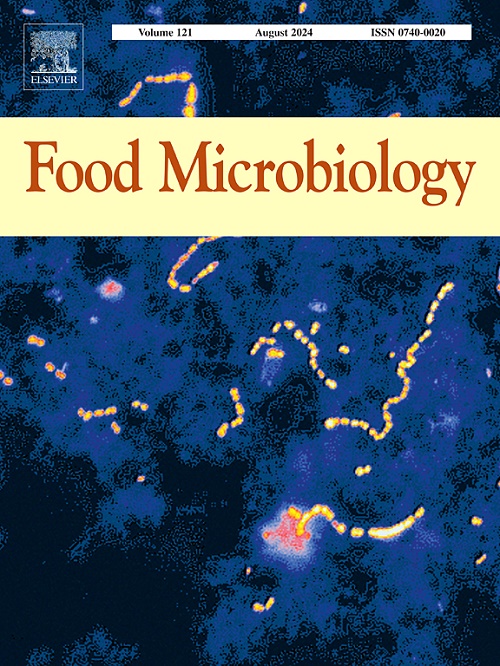基于元基因组学的人工和天然坑泥微生物群落动态和风味开发潜力研究
IF 4.6
1区 农林科学
Q1 BIOTECHNOLOGY & APPLIED MICROBIOLOGY
引用次数: 0
摘要
浓香型白酒(SFB)的生产一直依赖于坑泥(PM)作为启动培养基。天然坑泥(NPM)的成熟时间约为 30 年,因此成熟时间更短的人工坑泥(APM)受到广泛关注。本研究揭示了人工乳酸菌和天然乳酸菌在微生物和功能上的差异,有助于阐明微生物在底物降解和风味形成过程中的不同代谢作用。在 APM 和 NPM 之间观察到了微生物群落的显著差异,表现为核心微生物丰度的不同。根据元基因组分选技术,共获得了 187 个高质量的元基因组(MAGs),主要包括固氮菌(n = 106)、类杆菌(n = 15)和绿僵菌(n = 14)。此外,4 年 APM 中风味化合物的相对浓度与 30 年 NPM 中的风味化合物浓度相似,但与 100 年 NPM 中的风味化合物浓度不同。造成风味差异的主要细菌是甲烷杆菌(Methanosarcina)、甲烷杆菌(Methanobacterium)、甲烷球菌(Methanoculleus)、厌氧菌科细菌(Anaerolineae bacterium)和氨基杆菌(Aminobacterium)。从功能角度来看,氨基酸和碳水化合物代谢是 PM 微生物的主要功能,在 APM 和 NPM 之间存在差异。最后,发现多种微生物都存在底物降解和风味生成途径。将微生物的相对丰度与酶的绝对丰度相结合,发现梭菌、乳酸杆菌、佩特里莫纳菌、甲烷球菌、普雷沃特氏菌、甲烷杆菌、甲烷弧菌、甲烷菌丝、蛋白噬菌体、贝利亚菌、厌氧菌、厌氧嗜盐杆菌、合成单胞菌和布雷维菌是 APM 和 NPM 中的关键微生物。本文章由计算机程序翻译,如有差异,请以英文原文为准。
Metagenomics-based insights into the microbial community dynamics and flavor development potentiality of artificial and natural pit mud
Strong-flavor Baijiu (SFB) production has relied on pit mud (PM) as a starter culture. The maturation time of natural PM (NPM) is about 30 years, so artificial PM (APM) with a shorter maturation time has attracted widespread attention. This study reveals the microbial and functional dissimilarities of APM and NPM, and helps to elucidate the different metabolic roles of microbes during substrate degradation and flavor formation. Significant differences in the microbial community were observed between APM and NPM, manifesting as variations in the abundance of core microorganisms. Total of 187 high-quality metagenome-assembled genomes (MAGs) were obtained based on the metagenomic binning technology, mainly including Firmicutes (n = 106), Bacteroidota (n = 15) and Chloroflexota (n = 14). Furthermore, the relative concentration of flavor compounds in 4-year APM was similar to those in 30-year NPM, but different from those in 100-year NPMs. Methanosarcina, Methanobacterium, Methanoculleus, Anaerolineae bacterium and Aminobacterium were the key bacteria responsible for the flavor differences. From a functional perspective, amino acid and carbohydrate metabolism were key functions of PM microbial, and showed differences between APM and NPM. Finally, substrate degradation and flavor generation pathways were found to exist in multiple microorganisms. Combine the relative abundance of microorganisms with the absolute abundance of enzymes, Clostridium, Lactobacillus, Petrimonas, Methanoculleus, Prevotella, Methanobacterium, Methanosarcina, Methanothrix, Proteiniphilum, Bellilinea, Anaerolinea, Anaeromassilibacillus, Syntrophomonas and Brevefilum were identified as the key microorganisms in APM and NPM.
求助全文
通过发布文献求助,成功后即可免费获取论文全文。
去求助
来源期刊

Food microbiology
工程技术-生物工程与应用微生物
CiteScore
11.30
自引率
3.80%
发文量
179
审稿时长
44 days
期刊介绍:
Food Microbiology publishes original research articles, short communications, review papers, letters, news items and book reviews dealing with all aspects of the microbiology of foods. The editors aim to publish manuscripts of the highest quality which are both relevant and applicable to the broad field covered by the journal. Studies must be novel, have a clear connection to food microbiology, and be of general interest to the international community of food microbiologists. The editors make every effort to ensure rapid and fair reviews, resulting in timely publication of accepted manuscripts.
 求助内容:
求助内容: 应助结果提醒方式:
应助结果提醒方式:


